IOS Workshop on the Contemporary Political Scenario in India
February 15, 2014 at IOS Conference Hall, New Delhi
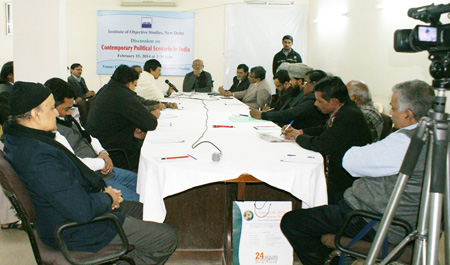
The Chairman of the Institute of Objective Studies (IOS), Dr. Mohammad Manzoor Alam, has urged Muslim leaders, representing different groups, to reach an understanding for working out an agenda to approach the political parties to pledge support to their demands. Presiding over the discussion on the “Contemporary Political Scenario in India “organised by the IOS at its Conference Hall here on February 15, 2014, he admitted that Muslim groups united and broke several times in the past. But the current political situation had once again offered them an opportunity to be realistic about their demands.
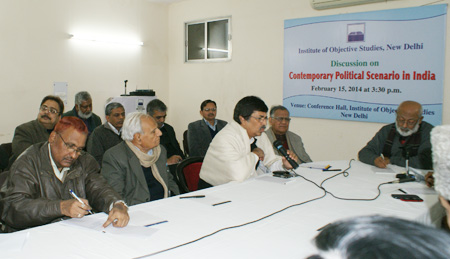
He asked Muslim leadership and other stakeholders to articulate their stand on various issues confronting the Muslim community. Hailing the Indian Constitution as a saviour of interests of all citizens, he noted that the right to liberty, equality and free speech enshrined in the Constitution could be upheld by affirmative action by government. Expressing serious concern over the present atmosphere of communal peace being sought to be vitiated by votaries of violent Hindutva, he pleaded against forming a united Muslim outfit to enter the election fray. He cited the country’s demography and other dimensions as reasons for not floating a Muslim party to contest elections.
He, however, underlined the need for thrashing out a common minimum programme for the community to move ahead. The concept of a two-party system in India, he said, was propounded by Sardar Vallabhbhai Patel which saw the emergence of National Democratic Alliance (NDA) and the United Progressive Alliance (UPA) later. Credit goes to framers of the Constitution who made it sure that the multi-party system operated in India without hindrance. What would have happened if the Constitution had declared India as a Hindu Rashtra under which the minorities would have forfeited their right to universal adult suffrage, he asked. It was the Constitution that guaranteed citizens the right to life and liberty. It was the Constitution that empowered a citizen in the form of the Right to Information (RTI).
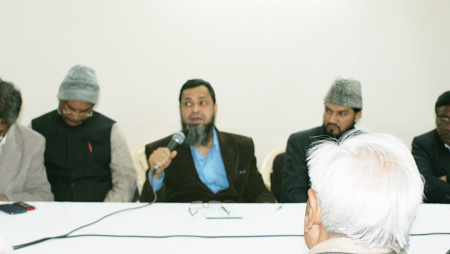
Making an impassioned plea to intellectuals of the community to take common Muslims along, Dr. Alam asked the leadership to evolve a consensus for opening a dialogue with the political parties on their demands without seeking any office for themselves. He said that the IOS was constantly engaged in the study of politico-social and economic empowerment of Muslims. He said that so far, nine volumes of the study had come out and the work on the next volume was in progress. He concluded by saying that the opinions discussed in the workshop would be analysed and the outcome sent to different stakeholders.
Earlier, the discussion got off to a start with the recitation of verses from the Quran by Hafiz Nazir-ul-Hasan. Initiating the discussion, the Secretary General of the IOS, Prof. ZM Khan highlighted the activities of the Institute in the field of research, publication and discussion on various issues. He said that an action plan would be prepared in the light of the conclusions drawn from the discussions and sent to other organisations. He called for inclusive attention to the marginalised sections of society. Explaining the concept of liberty and equality enshrined in the Indian Constitution, he said it was an admixture of the features of the Constitutions of US and the UK.
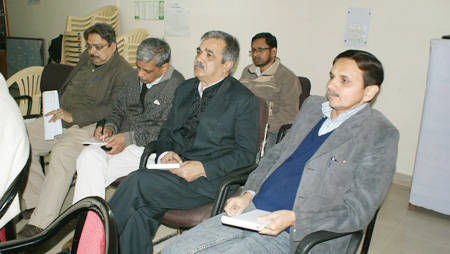
The constitutional structure was good in so far as governance was concerned. Referring to coalition governments, he said that it had come to stay in Indian politics. Calling for electoral reforms, he noted that some people had hijacked the system in their own interests and the media had played the role of a catalytic agent. Quoting the former Chief Justice of India, Mr. Justice AM Ahmadi, he said that the judiciary too was affected by the political environment. In order to polarise voters along communal lines, religion was freely used in polls to garner vote. Even communal violence was sparked off to reap rich harvest of votes, he added.
Dr. Arshi Khan, from the Department of Political Science, Aligarh Muslim University, insisted that two circles – auspicious and vicious, emerged in post-1947 India. While the majority community benefited from the auspicious circle, Muslims suffered under the vicious circle. They still faced the complex problem of dignity. The Scheduled Castes and Scheduled Tribes, however, secured dignity. Muslims lacked dignity and liberty due to which they were not proportionately represented in democratic institutions. Favouring introduction of proportional representation system, he said that it was the only way out of the present mess. He commented that democracy could not succeed without the enforcement of the rule of law, adding that legitimacy was the most important element of the state.
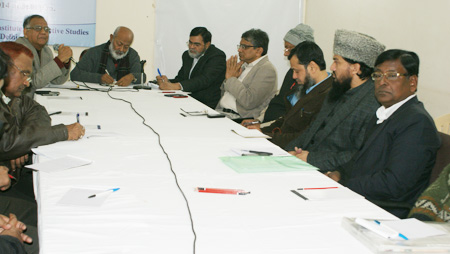
The General Secretary of the Lok Jan Shakti Party, Dr. Abdul Khaliq, pointed out that the dividing line between secular and communal had blurred in the current political scenario. Lambasting political parties for making empty promises to Muslims, he said that it was a ploy to divide their vote. Muslim votes among the secular parties were divided, giving an edge to the BJP. He opined that by promising reservation to Muslims in jobs, education and other institutions ranging from 4 to 20 per cent, these parties were only helping communal forces to corner Muslims.
That was the reason why the promises made in 2004 had not been fulfilled. The RSS had succeeded in its efforts to infiltrate the bureaucracy, judiciary, armed forces and other institutions. Reservation to Muslims was tom-tomed to give a handle to the BJP to convince the majority community of the “appeasement” of Muslims. Reading the writing on the wall, Muslims should understand the ground reality. While reservation to them was a distant possibility, they must articulate their demands. Describing the Rangnath Commission Report as a big mistake, he advised the Muslims to concentrate more on their basic needs that could be easily met.
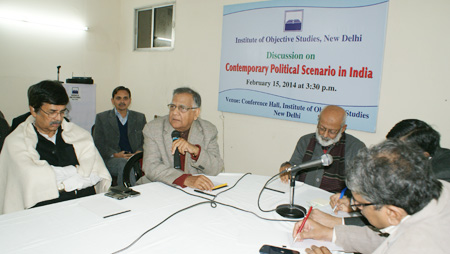
Mr. Navaid Hamid from the Movement for Empowerment of Indian Muslims, expressed the view that the Indian politics would remain in the churning process for some more time. He wanted to know why the Muslims should take upon themselves the responsibility to protect the Constitution. The duty to protect the Constitution rested with the state. Referring to challenges of exclusive politics, he said that Narendra Modi, who was the most hated man in 2002, had abruptly become a force to reckon with after his anointment as prime ministerial candidate of the BJP.
Advocate and Human Rights activist, Mr. Arun Majhi said that an Indian today was not identified as an individual, but with his caste, religion, and ethnicity. He said that the existing Brahminical system was engaged in the exploitation of Dalits, OBC and Muslims. The Brahminical system was peacefully operating, leaving no room for the working class to assert itself. He observed that corruption was not an issue for the upper castes as they wanted the money to come to them, instead of the pockets of the babus. Hitting out at the civil society, he pointed out that it meant upper and middle castes only. There was no place for Dalits, oppressed and the deprived sections. Terming Modi as a mascot for the neo-Brahminical order, he said that the Gujarat Chief Minister represented monopoly capital and the Hindutva ideology. He was being projected to seek space in a democracy. Attempts were also being made through Narendra Modi to thrust upon India a presidential form of government. He called for mobilising people against these machinations.
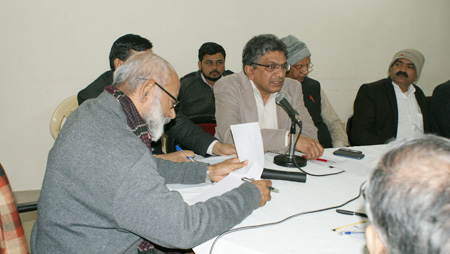
Mr. Qasim Syed, editor of the Urdu daily Khabrein remarked that communal elements were present in the Congress before and after independence. He said that it was puzzling to note that even after sharing power with the BJP, the secular parties claimed to champion the cause of secularism. In this connection, he mentioned the names of Ram Vilas Paswan, Mulayam Singh Yadav, Mamta Banerjee and Nitish Kumar. He questioned the logic of permanently supporting a particular political party even though there were no permanent friends and foes in politics. Muslims alone had not taken the onus to protect secularism, remarked.
The Vice-Chairman of the IOS, Prof. Rifaqat Ali Khan, raised the question of co-existence of Muslims with the majority community in an atmosphere surcharged with hatred and communal bias. Mr. MH Ghazali from the Pasmanda Samaj Sangathan warned of the impending danger from capitalism and neo-liberalism. He said that the meeting of the US ambassador in India with Narendra Modi recently should be viewed in this perspective. He continued that the neo-liberalism offered a big foreign market in India and capitalism was trying to set a foothold in our country. Referring to Anna Hazare’s movement, he said that it had succeeded in diffusing public ire against price rise to an extent, adding that corruption had not yet been defined.
He called for building bridges with the deprived and disadvantaged sections of society. Mr. Rahul Gautam warned of a deep-rooted conspiracy against Ddalits, weaker sections and Muslims. He aked why only Muslims should speak of secularism. He called upon Dalits, oppressed and the OBCs to come out with an agenda to protect secularism.
Mr. Mujtaba Farrooq, National President, Welfare Party of India, reminded Muslims of their strength and called upon them to articulate it at the constituency level. Taking a cue from the experience in Assam where Muslims won 46 seats out of 147 Assembly seats, he said that social concern was futile without an initiative. He suggested to formulate a strategy for the next 5-10 years.
Mr. Kailash Goduka, Secretary, Parivartan, an NGO, emphasised the need for bridging the gap between different communities. He said that religion would sustain as long as humanity survived. Mr. Mirza Zakir Beg from All India Milli Council, laid stress on finding solution to vexatious issues unitedly. This was also the case with fascism which needed to be countered unitedly. Making a fervent plea for Hindu-Muslim unity, he sought to enlist the support of the depressed and deprived sections.
The discussion ended with an announcement to meet again on the issue. Dr. Nakhat Husain Nadvi, who conducted the proceedings, proposed a vote of thanks. The discussion attracted well-known public figures, academics, leaders from across the political spectrum, social activists and prominent citizens.
Go Back